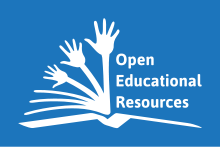Open Educational Resources/Lesson
Appearance

This lesson introduces Open Educational Resources (OER) and provides essential background information and understanding for educators preparing to develop and use OER content. Activities include a review of different OER repositories, content availability and restrictions.
Readings
[edit | edit source]- Wikipedia: Open educational resources
- Wikiversity: Open Educational Resources
- WikiEducator: OER Handbook for Educators
- Wikipedia: Creative Commons license
Activities
[edit | edit source]- Review the lesson summary, key terms, review questions and flashcards below.
- Use the Discuss page to post comments and questions regarding this lesson.
- Consider ways in which open educational resources might be used to enhance content offerings for your students.
- Create a table to compare OER repositories. Include columns for Repository, Content Types Available, Education Level, Audience, Quality, License, Who Can Contribute, Approval Process, and Notes. Based on your discipline and your students' educational level, select and compare relevant repositories and some of the content available. For example:
Repository Content Level Audience Quality License Contributors Approval Notes BC Open Textbooks Open Textbooks Listing College Teachers High Varies Teachers Review College Open Textbooks Open Textbooks Listing College Anyone Varies Varies Authors Review Community College Consortium Varies College Anyone Varies Varies Varies Varies Creative Commons Multimedia Primary, Secondary, College Anyone Varies Varies Anyone None Curriki Lessons, Collections Primary, Secondary Teachers Ratings CC-BY Teachers Review Global Text Project Textbooks College Anyone Varies CC-BY Varies None Lumen Learning Courses College Anyone High Varies Teachers Review MERLOT II Courses, Lessons, Other Primary, Secondary, College Teachers Ratings CC-BY Anyone None MIT Open Courseware Courses College Anyone High CC-BY-NC-SA MIT Professors N/A OER Commons Courses, Lessons, Other Primary, Secondary, College Anyone Ratings CC-BY-SA Anyone Review OpenStax Textbooks College Anyone High CC-BY Teachers Review Saylor.org Courses College Anyone High CC-BY By Contract N/A Wikibooks Textbooks Primary, Secondary, College Anyone Varies CC-BY-SA Anyone None WikiEducator Lessons Primary, Secondary Teachers Varies CC-BY-SA Anyone None Wikiversity Courses, Lessons, Other Secondary, College Anyone Varies CC-BY-SA Anyone None
Lesson Summary
[edit | edit source]- Open educational resources (OER) are freely accessible, openly formatted and openly licensed documents and media that are useful for teaching, learning, education, assessment and research purposes.[1]
- Available OER content types include courses, modules, lessons, textbooks, and a variety of other resources.[2]
- Different OER initiatives have been established targeting a variety of content types (courses, textbooks, or individual learning objects), target audiences (educators, parents, students), and contributor qualifications (contract, peer-reviewed, open).[3]
- Most OER are now licensed under one of several Creative Commons public copyright licenses that allow the distribution of copyrighted works.[4][5]
Key Terms
[edit | edit source]- accessibility
- The degree to which a product, device, service, or environment is available to as many people as possible.[6]
- CC-BY
- Creative Commons - Attribution license.[7]
- CC-BY-NC-SA
- Creative Commons - Attribution - Non-Commercial - Share Alike license.[8]
- CC-BY-SA
- Creative Commons - Attribution - Share Alike license.[9]
- Creative Commons license
- One of several public copyright licenses that allow the distribution of copyrighted works.[10]
- digital divide
- An economic inequality between groups, broadly construed, in terms of access to, use of, or knowledge of information and communication technologies (ICT).[11]
- open content
- Describes a creative work that others can copy or modify.[12]
Review Questions
[edit | edit source]-
Open educational resources (OER) are _____ that are useful for teaching, learning, education, assessment and research purposes.Open educational resources (OER) are freely accessible, openly formatted and openly licensed documents and media that are useful for teaching, learning, education, assessment and research purposes.
-
Available OER content types include _____.Available OER content types include courses, modules, lessons, textbooks, and a variety of other resources.
-
Different OER initiatives have been established targeting a variety of _____, _____, and _____.Different OER initiatives have been established targeting a variety of content types, target audiences, and contributor qualifications.
-
Most OER are now licensed under one of several _____ that allow the distribution of copyrighted works.Most OER are now licensed under one of several Creative Commons public copyright licenses that allow the distribution of copyrighted works.
Flashcards
[edit | edit source]See Also
[edit | edit source]- Community College Consortium for Open Educational Resoures
- Lumen: Adopting Open Educational Resources in the Classroom
- OpenSource: Creating Open Textbooks
- A Guide to Making Open Textbooks with Students
- CARLI: OER Presentations and Webinars
References
[edit | edit source]- ↑ Wikipedia: Open educational resources
- ↑ Wikipedia: Open educational resources#Types
- ↑ Wikipedia: Open educational resources#Initiatives
- ↑ Wikipedia: Open educational resources#Licensing
- ↑ Wikipedia: Creative Commons license
- ↑ Wikipedia: Accessibility
- ↑ Wikipedia: Creative Commons license#Combinations
- ↑ Wikipedia: Creative Commons license#Combinations
- ↑ Wikipedia: Creative Commons license#Combinations
- ↑ Wikipedia: Creative Commons license
- ↑ Wikipedia: Digital divide
- ↑ Wikipedia: Open content
